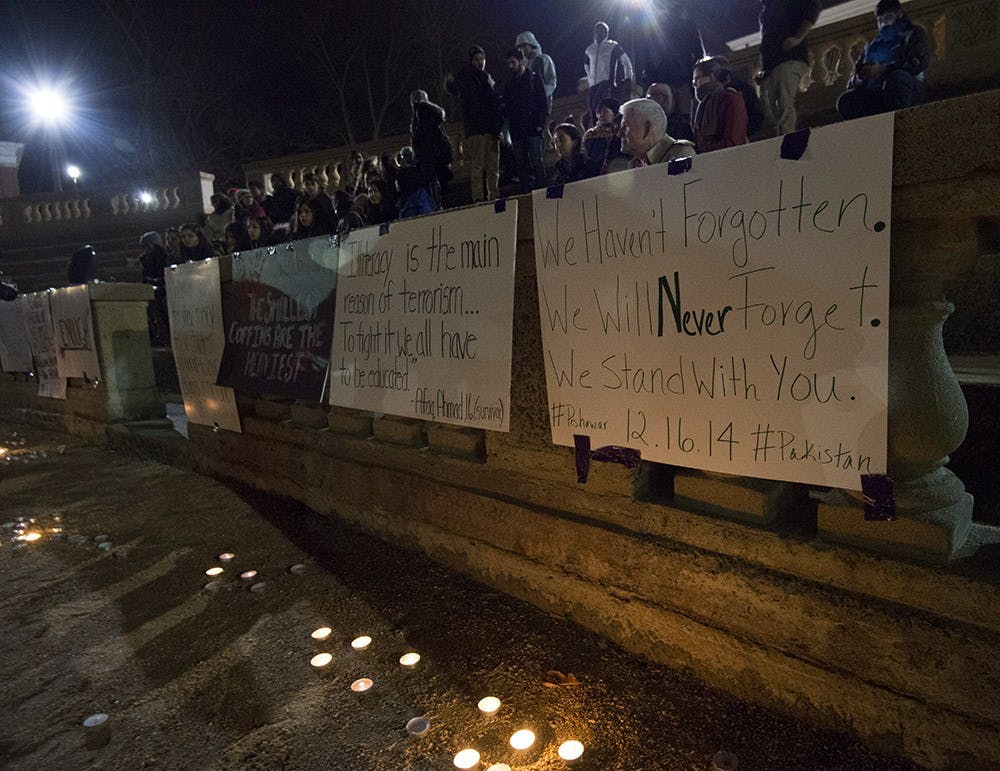Members of the University community gathered in the Amphitheatre Tuesday night for a candlelight vigil to remember the more than 130 victims of a December school shooting in Peshawar, Pakistan — most of whom were children.
The event, organized by third-year College student Khadija Razzaq, sought to recognize not just the victims in Peshawar, but also the terrorists attack that have occurred across the globe in recent months.
“There are so many [terrorist attacks] that happen, and it’s sad that we’re not able to cover each attack that happens, even though I would love to,” Razzaq said. “Doing one will bring awareness for others to know it’s happening and keep it in your mind.”
Second-year College student Sundus Razzaq began the vigil and spoke of her family members who live near the school in Peshawar and of the unifying thread which connects perpetrators of violence.
“Here at U.Va. we’re educated and informed, and that’s how it should be,” she said. “We’re expected to be able to distinguish between who is the enemy. We should know these perpetrators all belong in one category. They all share the same trait bred by ignorance.”
English Prof. Lisa Goff addressed Pakistani students, quoting “This Little Light of Mine.”
“The song celebrates the individual light, the single light glowing in the darkness,” Goff said. “It’s charming but it’s not sufficient. This [vigil] is much closer to a solution in a lot of ways — a collective light. … Let that shine.”
Many of the school children who died in the attack were children of soldiers in the army. Dean of Students Allen Groves spoke of the pain individuals feel following the death of children.
“If at any time a light is lost to violence, we tend to react with anger and grief,” Groves said. “One of the most unnatural things to happen is for a child to predecease their parents. Those parents will never fill that hole in their hearts. While every life is important, the life of a child being cut short is particularly egregious and that causes particular pain.”
The school reopened three weeks after the attack, representative of the feeling of hope among the students and the local community, said third-year Engineering student Haider Inam, who visited the school roughly two weeks after the incident.
“I met the survivors,” he said. “There was a unity, a frame of thought they were united upon, hoping for a better Pakistan and a Pakistan with a brighter future. All of the terrorist activities aren’t just a threat to the education in Pakistan. It’s a threat to the lives of students and their mentality all over the world.”
Second-year College student Yasmina Abdous said it is important to recognize acts of terror that occur across the globe.
“I think it’s important for [the attack] be recognized in the community just because all lives matter, and today it seems that some are shown to be more important than others,” she said. “But everyone is the same. So every act of terrorism or mass murder should be commemorated.”
All citizens, first-year Engineering student Taji Harris said, should show support in the face of hardship and crisis.
“Beyond the student body, I think it’s good for every person that’s aware to express some type of support,” Harris said. “This is just a good act of humanity, and I believe it extends upon any type of responsibility. It’s a civil duty to show support for other humans when a tragedy like this happens.”
Khadija Razzaq said she believes vigils will help raise awareness for these issues across the globe — beyond what is focused on in particular news outlets.
“It’s not like we can actually do anything about it in this stage in our lives, but keep it in your brain and do something about it in the future so humanity can be sane again,” Razzaq said.







